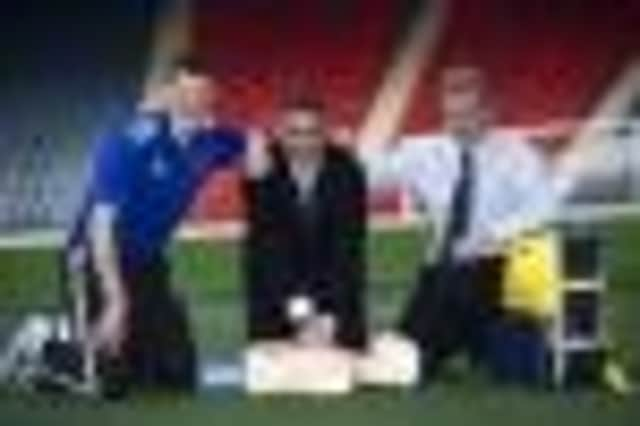O’Donnell and Muamba show Coyle importance of new first aid project


“I jumped in the car and drove up from England,” he said of his appearance at Hampden yesterday for the launch of the initiative.
Coyle was an obvious fit for the role. The Glaswegian is a fierce promoter of all that is good about, and good for, the Scottish game, from top to bottom. More than that, as manager of Bolton Wanderers at the time of Fabrice Muamba’s on-pitch cardiac arrest, he witnessed first-hand the genuinely life-saving properties of immediate and appropriate medical intervention.
Advertisement
Hide AdAdvertisement
Hide AdThat March miracle transformed into a global good news story after Muamba recovered despite his heart having stopped for 78 minutes. The 24-year-old may have had to retire from football but the normality of his day-to-day existence is reflected in the fact he has already filmed an appearance on the Strictly Come Dancing Christmas special.
“There were a number of things that all came together that night and, if it hadn’t been at White Hart Lane, I’ve no doubt it might have been a different outcome,” Coyle said of Muamba’s collapse during a game against Tottenham Hotspur. “The medical staff were all highly trained but, within that, you had Andrew Deaner, the leading cardiologist, who was actually in the crowd. He came on to the pitch and played his part.
“I will always think back to the sequence of events that night. It got Fabrice to where he is just now. That in itself is remarkable because [of how long] his heart stopped. The fear afterwards was had he suffered any brain damage. Thankfully, when you see him today, you see that is not the case. That’s why programmes such as the one being launched by the Scottish Football Partnership are so important. When I was asked to come along and support this I didn’t think twice.
“As much as we love the game, it’s the best game in the world, it paled into insignificance that night. Fabrice’s well being was most important. He has a beautiful wife and a young son, it was important he got back to having some quality of life for them.
“Of course the experienced changed me, I think it changed all of us. The support Fabrice and the club received was overwhelming, it was very humbling and, I think, with programmes like this, something good has come of it. How I coped was down to how I’d been brought up.
“You do what you have to do and you rely on your background and upbringing. You just try and do what you think is best. I don’t know what would have happened had Fabrice not made a full recovery. As well as being his team-mates the players at the club were his friends. It took its toll on a number of them.”
The toll such a tragedy can inflict is still being felt by the nearest and dearest of Phil O’Donnell. Next week will mark the fifth anniversary of the midfielder’s death while playing for Motherwell.
For Coyle, O’Donnell’s loss demonstrates the vital nature of such a programme. It will see in excess of £100,000 committed from the Scottish Football Partnership to provide first aid training. More than 1,000 of the coaches instructed will be those who participate at youth and junior level. The Scottish FA’s medical officer Dr John MacLean yesterday pointed out that the coaches will be trained in aspects such as the special nature of football injuries, judging when a player needs to be removed from the field of play and recognising what not to do, as much as what to do, in cases of head injuries or bone fractures.
Advertisement
Hide AdAdvertisement
Hide Ad“A programme like this is long overdue,” Coyle said of the project. “Who is to say what would have happened that night [with Phil and if anything] would have made a difference. I don’t know. The events of that night are still so raw. As well as being an outstanding footballer more importantly he was an outstanding man. I thought the world of Phil.
“His was a high-profile case, as was Fabrice’s. But something like this can help people across the board. It shows we are moving forward. A lot of these things go unnoticed. Prior to Phil you had another young lad at Motherwell called Andy Thomson. I was at the club and he passed away at 17. He’d been feeling unwell, he was sent home and that night he passed away. Sometimes these things don’t show themselves on medicals so it’s all the more important to have trained people trackside.”
Seeking means to reduce the health risks for those who take part in sport must be an endless, limitless quest, Coyle believes.
“I don’t know if you can ever do enough,” he said. “You have to keep doing what you’re doing and you’ve got to keep trying. I know sometimes it comes down to finances but, for something as important as this, then surely we can find the funding for programmes such as this. If it saves one life then we will have achieved something.”